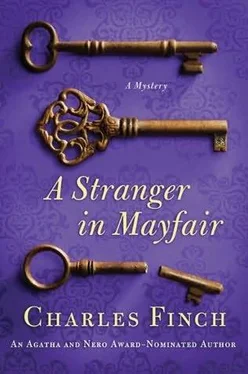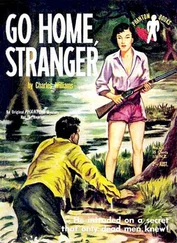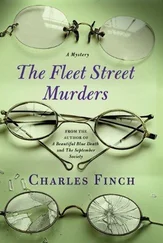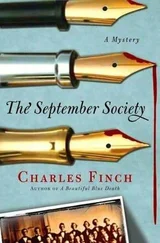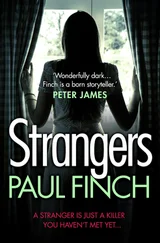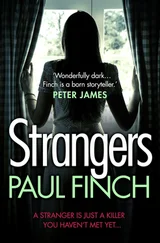Charles Finch - A Stranger in Mayfair
Здесь есть возможность читать онлайн «Charles Finch - A Stranger in Mayfair» весь текст электронной книги совершенно бесплатно (целиком полную версию без сокращений). В некоторых случаях можно слушать аудио, скачать через торрент в формате fb2 и присутствует краткое содержание. Жанр: Исторический детектив, на английском языке. Описание произведения, (предисловие) а так же отзывы посетителей доступны на портале библиотеки ЛибКат.
- Название:A Stranger in Mayfair
- Автор:
- Жанр:
- Год:неизвестен
- ISBN:нет данных
- Рейтинг книги:3 / 5. Голосов: 1
-
Избранное:Добавить в избранное
- Отзывы:
-
Ваша оценка:
- 60
- 1
- 2
- 3
- 4
- 5
A Stranger in Mayfair: краткое содержание, описание и аннотация
Предлагаем к чтению аннотацию, описание, краткое содержание или предисловие (зависит от того, что написал сам автор книги «A Stranger in Mayfair»). Если вы не нашли необходимую информацию о книге — напишите в комментариях, мы постараемся отыскать её.
A Stranger in Mayfair — читать онлайн бесплатно полную книгу (весь текст) целиком
Ниже представлен текст книги, разбитый по страницам. Система сохранения места последней прочитанной страницы, позволяет с удобством читать онлайн бесплатно книгу «A Stranger in Mayfair», без необходимости каждый раз заново искать на чём Вы остановились. Поставьте закладку, и сможете в любой момент перейти на страницу, на которой закончили чтение.
Интервал:
Закладка:
“I’m after information, actually,” said Dallington.
“Oh?” said Trask, crestfallen.
“Well-why not send me another crate of champagne.”
“Excellent! I’ll have the boy take it over this afternoon. Let me find my book, here…” He pulled a ledger off a nearby crate of wine and made a note in it.
“Do you know anything of the butcher next door?”
“Schott?”
“And son,” added Lenox.
“It’s only the son,” said Trask. “Old Mr. Schott died four years ago, and his son runs the place with a cousin now.”
“Do you know where he’s been the past two days?” asked Dallington.
“No, and it’s quite unusual. When Schott is sick his cousin is usually there, at least, or the other way round sometimes. They don’t often close.”
“You haven’t heard anything else?”
“No. Shall I tell you if I do?”
“Please-that would be wonderful.”
“May I ask why you gentlemen want to know?”
“To settle a bet,” said Dallington.
“Not the first time I’ve done that-do you remember, sir, coming in with the stopwatch to see whether you or your young friend could drink a bottle of wine in under ten minutes? An exciting day, that was.”
“Yes, yes,” said Dallington hurriedly, “well-thank you-I’ll expect that champagne. Good-bye!”
Outside again they walked in silence for thirty seconds, Lenox smiling inwardly.
Dallington stopped and with an irritable grimace said, “Well? They know me at the wine store, as no doubt you’ll have observed.”
“Did you drink it all? In under ten minutes?”
“Oh, bother it,” said Dallington and stepped into the carriage. “If you have time, let’s go see Clarke’s mother again.”
She was still at the Tilton Hotel in Hammersmith; unfortunately she was now in a bad way. With the passing of time her stern resolve to stay until her child’s murderer was found had changed into a mother’s grieving dissolution. She smelled of gin, and wept twice in their presence.
“Have you spoken to any of Frederick’s friends?” asked Lenox.
“No, no-the poor boy!”
“Did he mention a friend-a butcher?”
“A butcher? He never would have associated with that kind-the poor boy!”
And so forth.
“Don’t feel guilty,” Dallington told her just before they left. “It’s not your fault.”
“He needed someone. A real father would have protected him,” she said. “That’s what he needed-he should have had a real father. Ludovic-Mr. Starling-he could have been that, when I entrusted my poor Freddie with him. Or at least a friend. It’s not right to leave a boy alone in a city like this. I should have been here-I should have come down from Cambridge more often…”
And fresh tears.
When they finally managed to elicit her opinion on Collingwood’s confession, all she could say was that it shouldn’t have happened-that someone should have protected her only son.
The two detectives left dispirited. They had tried to give her some solace by speaking in euphemism about death and afterlife, but she would receive none.
“I must go home now,” said Lenox.
“What can I do?”
“You could try Fowler again.”
“Very well.” Dallington smiled. “And thanks for waking me up, even though it seemed like a cruel thing to do at the time.”
When he arrived back in Hampden Lane, starving and feeling just marginally more intelligent about the whole messy Starling question, the house looked somehow brighter to him. Its matched and yet strangely mismatched facade, only partially a house still-it needed to be lived in longer-finally gave him a feeling of contentment.
Inside, all was in confusion. Footmen were moving furniture to and fro, the door to the servants’ quarters downstairs was swung wide open into the front hall, and over it all Kirk was presiding, harassed.
“Are we being evicted?” asked Lenox.
“No, sir, not to my understanding.”
“It was a joke-a poor one, I’m afraid. What’s the row?”
“I see now, sir-very good-ha, ha. If your question refers to the activity in the house, this is the standard preparation for one of Lady Lenox’s Tuesday evening parties.”
That explained it. “Does she always go to such lengths?”
From the front stairway Lady Jane’s voice called out, “Charles, are you there? Leave Kirk alone, the poor dear has a great deal to do.”
“There you are,” said Lenox, finding her as she trotted back up the stairs. “Can’t you stop to say hello?”
“I wish I could! But I want this evening to be memorable-your first days in Parliament, you know!”
“I forgot all about it. Will there be any dratted soul I can talk to there?” said Lenox moodily.
“Oh, yes, you and Edmund can sit in the corner and grumble together while the adults make conversation.”
She turned as she reached their bedroom, and her warm smile showed she was teasing; a perfunctory kiss and she had gone to her changing room. “Toto may come!” she called as she walked.
Lenox, who was nearly hit by a passing bookcase, beat a rapid retreat to his study. On the desk there was a stack of blue books that needed his attention. Leaning back in his chair, his feet propped up on the ledge of the tall window that looked over Hampden Lane, he picked one up. “Railroad and Waterway Taxation,” it was called. There was a note in Graham’s surprisingly messy, quick script (he was so fastidious in other ways) that read, Many important men are interested in this subject. Please study carefully.
With a sigh Lenox turned to the first page and started to read.
Chapter Thirty-Five
Kirk might not have known all of Lenox’s idiosyncrasies, but there were few like him in London for a party. When at eight o’clock that evening Lenox went into the rose-colored drawing room (now quite large after the joining-up of the houses, though Jane had done well to create several small sitting areas within it), he saw three long tables piled close with food and drink. On one was the hot food, a nod toward incipient autumn: roast fowl with watercress, jugged hare, steak and oyster sauce. On the next was cold food, appropriate for the summer that was now passing out of existence: cold salmon, dressed crab, and a great bowl of salad. Finally, on the third table were drinks. There was champagne, of course, and a drink made of champagne and cold sherbet, which many of the women liked if the room became overhot. There was wine in plentiful quantities besides, and for the gentlemen spirits. At the center of the table was the party’s true heart, an enormous silver punch bowl filled to the brim with orange (or peach?) colored naval punch.
Footmen stood behind each table, ready to serve. What was considered charming about Jane’s Tuesdays-and even by some inappropriate-was their informality. All around the room were card tables and sideboards where people could set their plates, but beyond that there was no central dining table. It was rather like being with family for breakfast on the morning after a great party; everyone with a bit of something on a plate, milling through the room and chatting. Tonight there would be thirty people or so, half of them who might be deemed friends, the other half who would more properly be called personages.
“You’re home, sir,” said a voice behind Lenox, who was asking for a glass of punch.
“Ah-Graham. I just got back.”
He had just rushed home from Parliament and changed. The immemorial practice of the House was to convene in mid afternoon and go late into the night; on the face of it an impractical schedule, until one remembered that there was a great deal of work done in the morning and early afternoon to prepare for the later assembly. In fact the morning work was perhaps more important, and now that they were just finished debating the Queen’s Speech the House would be only lightly populated for the rest of the evening.
Читать дальшеИнтервал:
Закладка:
Похожие книги на «A Stranger in Mayfair»
Представляем Вашему вниманию похожие книги на «A Stranger in Mayfair» списком для выбора. Мы отобрали схожую по названию и смыслу литературу в надежде предоставить читателям больше вариантов отыскать новые, интересные, ещё непрочитанные произведения.
Обсуждение, отзывы о книге «A Stranger in Mayfair» и просто собственные мнения читателей. Оставьте ваши комментарии, напишите, что Вы думаете о произведении, его смысле или главных героях. Укажите что конкретно понравилось, а что нет, и почему Вы так считаете.
